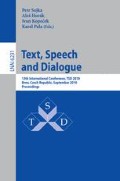Abstract
The main idea of a priori machine learning is to apply a machine learning method on a machine learning problem itself. We call it “a priori” because the processed data set does not originate from any measurement or other observation. Machine learning which deals with any observation is called “posterior”. The paper describes how posterior machine learning can be modified by a priori machine learning. A priori and posterior machine learning algorithms are proposed for artificial neural network training and are tested in the task of audio-visual phoneme classification.
Access this chapter
Tax calculation will be finalised at checkout
Purchases are for personal use only
Preview
Unable to display preview. Download preview PDF.
References
Heskes, T.: Empirical Bayes for Learning to Learn. In: Proceedings of ICML, pp. 367–374. Morgan Kaufmann, San Francisco (2000)
Vilalta, R., Drissi, Y.: A Perspective View and Survey of Meta-Learning. Artificial Intelligence Review 18, 77–95 (2002)
Kumar, R.: A Neural Network Approach to Rotorcraft Parameters Estimation (2007)
Hering, P., Šimandl, M.: Gaussian Sum Approach with Optimal Experiment Design for Neural Network, Honolulu, pp. 425–430. ACTA Press (2007)
Císař, P., Železný, M., Krňoul, Z., Kanis, J., Zelinka, J., Müller, L.: Design and Recording of Czech Speech Corpus for Audio-Visual Continuous Speech Recognition. In: AVSP 2005, Vancouver Island, pp. 1–4 (2005)
Potamianos, G., Neti, C., Iyengar, G., Helmuth, E.: Large-Vocabulary Audiovisual Speech Recognition: A Summary. In: Proc. Works. Signal Processing, Johns Hopkins Summer 2000 Workshop, pp. 619–624 (2001)
Grézl, F.: TRAP-Based Probabilistic Features for Automatic Speech Recognition. Ph.D. thesis, MUNI (2007)
Burnett, R.: Learning to Learn in a Virtual World, Milan, Italy. AERA (1999)
Brazdil, P., Giraud-Carrier, C., Soares, C., Vilalta, R.: Metalearning: Applications to Data Mining. Springer Publishing Company, Heidelberg (2008) (incorporated)
Schmidhuber, J.: Steps Towards ‘Self-Referential’ Neural Learning: A Thought Experiment. Technical Report CU-CS-627-92, Department of Computer Science and Institute of Cognitive Science, University of Colorado, Boulder, Boulder, CO (1992)
Author information
Authors and Affiliations
Editor information
Editors and Affiliations
Rights and permissions
Copyright information
© 2010 Springer-Verlag Berlin Heidelberg
About this paper
Cite this paper
Zelinka, J., Romportl, J., Müller, L. (2010). A Priori and A Posteriori Machine Learning and Nonlinear Artificial Neural Networks. In: Sojka, P., Horák, A., Kopeček, I., Pala, K. (eds) Text, Speech and Dialogue. TSD 2010. Lecture Notes in Computer Science(), vol 6231. Springer, Berlin, Heidelberg. https://doi.org/10.1007/978-3-642-15760-8_60
Download citation
DOI: https://doi.org/10.1007/978-3-642-15760-8_60
Publisher Name: Springer, Berlin, Heidelberg
Print ISBN: 978-3-642-15759-2
Online ISBN: 978-3-642-15760-8
eBook Packages: Computer ScienceComputer Science (R0)

